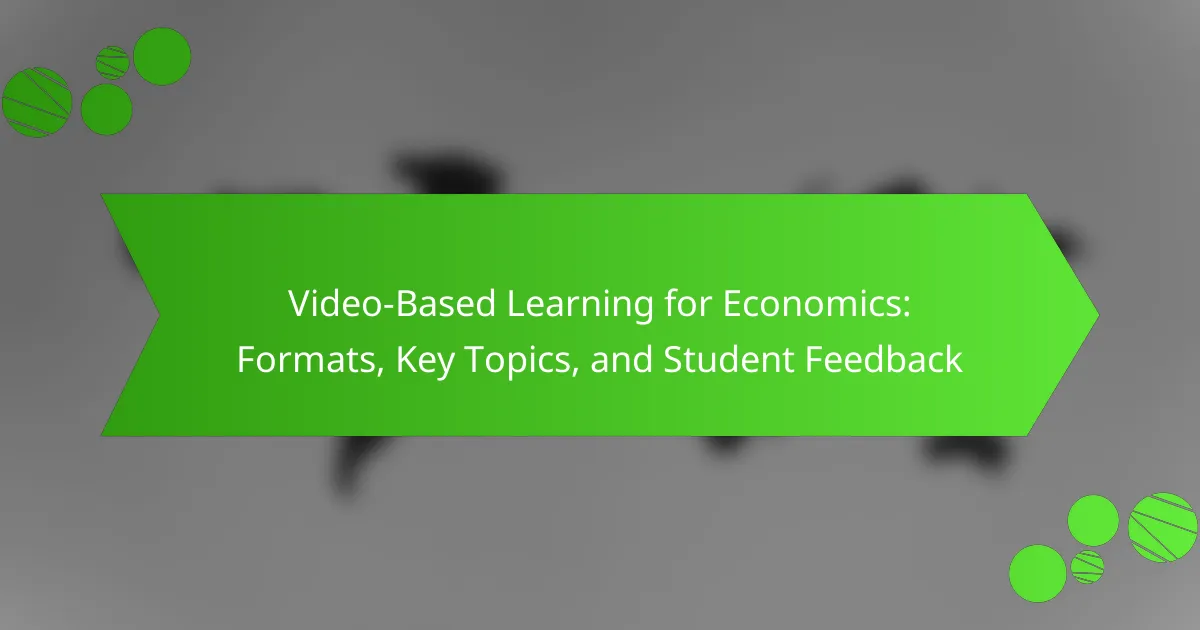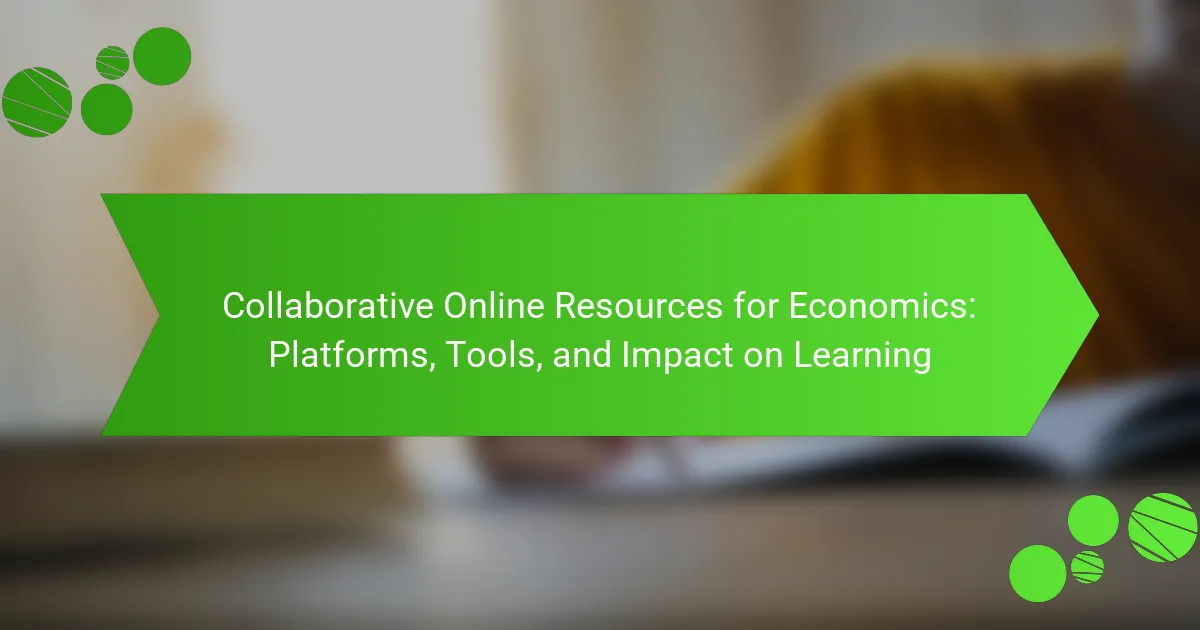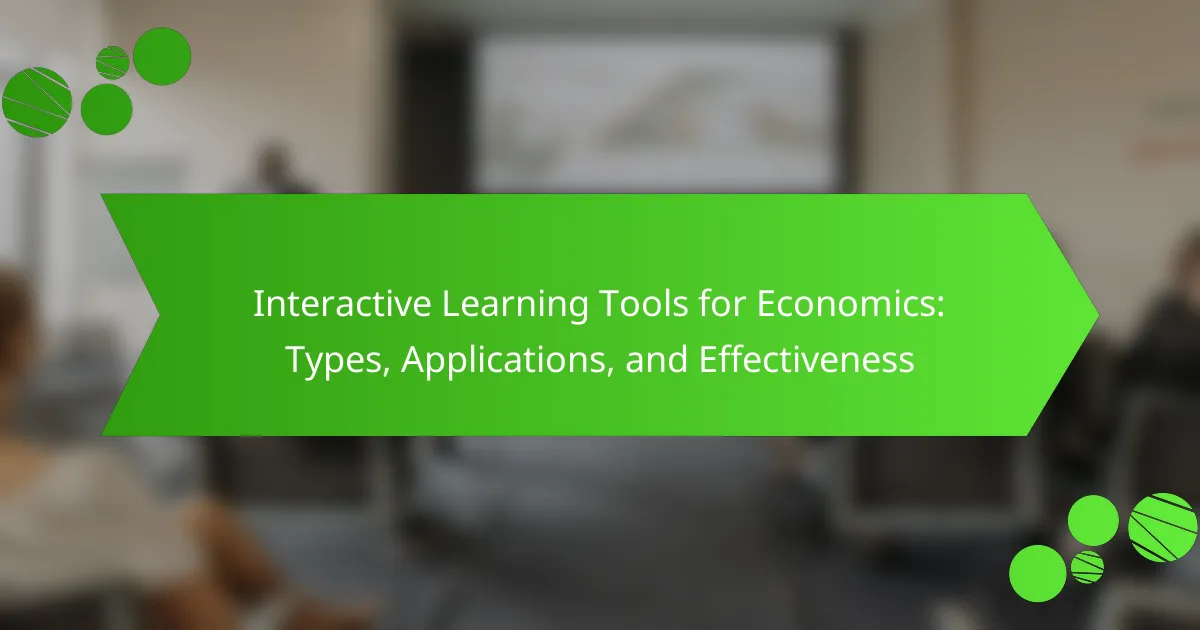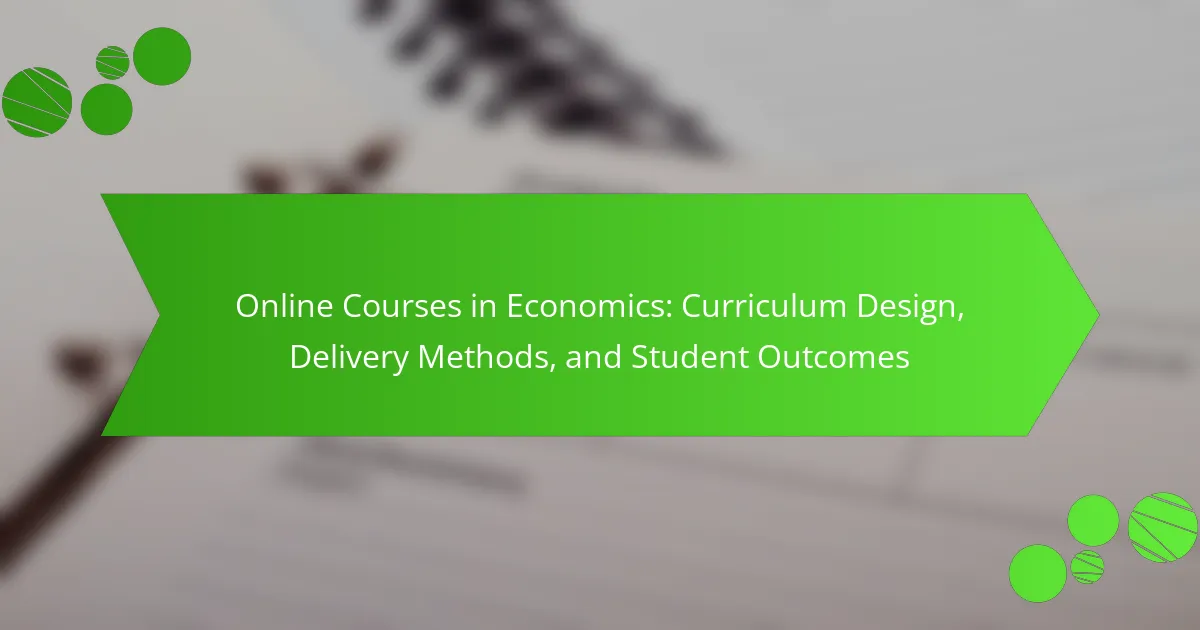Economics podcasts are audio programs dedicated to exploring various topics related to economics, including market trends, economic theories, and financial news. They feature expert interviews, discussions, and educational segments that provide insights into complex economic concepts and real-world applications. The growing popularity of these podcasts, evidenced by research indicating that 41% of Americans have listened to one, highlights their significance in promoting economic understanding. Through interactive discussions and timely content, economics podcasts engage audiences and foster critical thinking, making them an effective tool for lifelong learning in the field of economics.
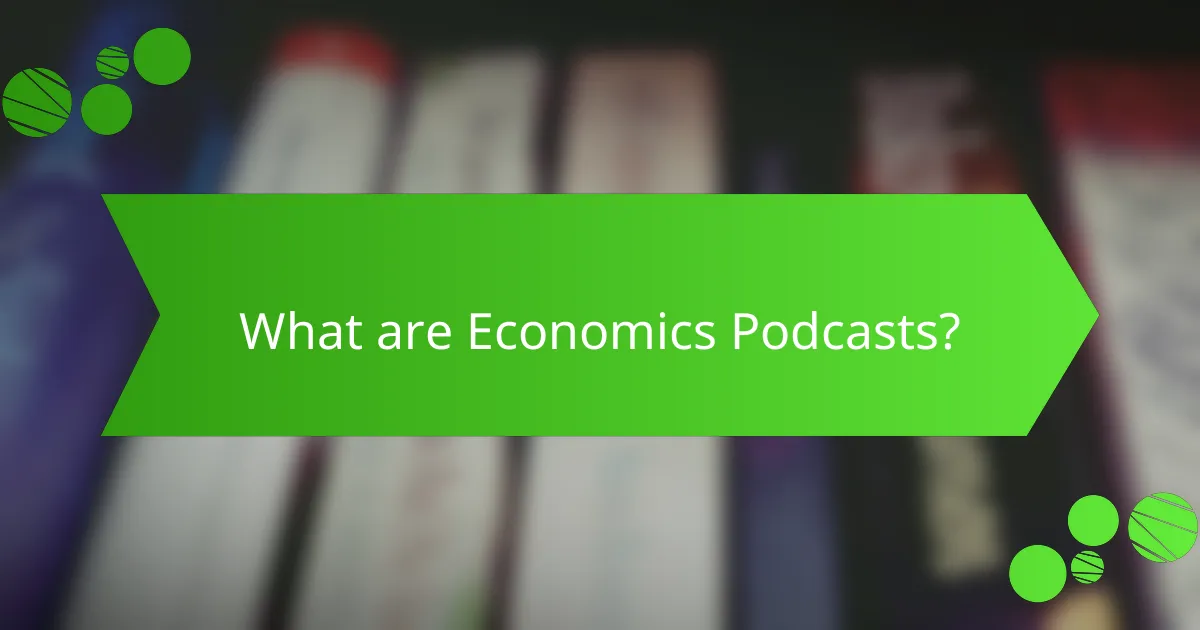
What are Economics Podcasts?
Economics podcasts are audio programs focused on topics related to economics. They cover various subjects such as market trends, economic theories, and financial news. These podcasts often feature expert interviews and discussions. They aim to educate listeners about economic concepts and real-world applications. The format allows for in-depth exploration of complex ideas in an accessible manner. According to a 2021 study by Edison Research, 41% of Americans have listened to a podcast, highlighting their growing popularity. This indicates a significant audience interested in economics content.
How do Economics Podcasts differ from traditional media?
Economics podcasts differ from traditional media primarily in their format and accessibility. Podcasts offer on-demand content, allowing listeners to engage with material at their convenience. Traditional media, such as television or radio, typically follows a scheduled programming format. This limits audience flexibility in consuming content.
Podcasts often feature in-depth discussions and interviews with experts, providing nuanced perspectives on economic topics. Traditional media may present shorter segments with less detailed analysis. The conversational style of podcasts fosters a more informal and engaging atmosphere.
Additionally, podcasts usually emphasize niche topics that may not receive extensive coverage in mainstream media. This allows for a broader exploration of economic issues. The interactive nature of podcasts enables audience participation through feedback and questions, enhancing engagement compared to traditional media formats.
What unique formats do Economics Podcasts utilize?
Economics podcasts utilize several unique formats. These formats include interviews with experts, panel discussions, and narrative storytelling. Interviews often feature economists discussing current trends and theories. Panel discussions allow multiple viewpoints on economic issues, fostering debate. Narrative storytelling presents economic concepts through real-life case studies or historical events. Additionally, some podcasts employ Q&A sessions, addressing listener inquiries about economic topics. These diverse formats enhance engagement and educational value for audiences. Research shows that varied formats can increase listener retention and interest in the subject matter.
How do the production values of Economics Podcasts compare to other media?
The production values of economics podcasts are generally lower than those of traditional media such as television or film. Economics podcasts often prioritize content and accessibility over high production quality. Many podcasts are produced by individuals or small teams with limited budgets. This contrasts with traditional media, which typically involves larger production teams and higher financial investment.
For example, a study by the Pew Research Center found that 75% of podcast creators work independently or in small groups. In comparison, television shows usually have extensive resources for sound engineering, set design, and editing. However, the intimate nature of podcasts allows for a unique connection with the audience, which can sometimes compensate for lower production values.
Listeners often appreciate the authenticity and relatability of informal production styles in podcasts. Overall, while economics podcasts may lack the polish of other media, they offer valuable insights and discussions that resonate with audiences.
Why are Economics Podcasts gaining popularity?
Economics podcasts are gaining popularity due to their accessibility and engaging content. They provide listeners with expert insights on complex economic topics in an easy-to-understand format. The rise of mobile technology has made it easier for individuals to consume audio content while multitasking. According to a 2021 report by Edison Research, podcast listenership has grown by 36% in the past five years. Additionally, economics podcasts often feature interviews with renowned economists, enhancing their credibility and appeal. The educational value offered by these podcasts attracts a diverse audience, including students, professionals, and curious individuals. This blend of informative content and engaging delivery contributes significantly to their growing popularity.
What factors contribute to the rise of Economics Podcasts?
The rise of Economics Podcasts is driven by several key factors. Increased accessibility to technology allows more people to listen to podcasts. A growing interest in economic issues has made these podcasts more relevant. The variety of content formats attracts diverse audiences. Educational value enhances listeners’ understanding of complex topics. Engaging hosts create a connection with the audience. The convenience of on-demand listening fits into busy lifestyles. Additionally, social media promotes podcast discovery and sharing. These factors collectively contribute to the popularity of Economics Podcasts.
How do listener demographics influence the growth of Economics Podcasts?
Listener demographics significantly influence the growth of Economics Podcasts. Different age groups show varying levels of interest in economic topics. Younger listeners often seek content that relates to current events and personal finance. In contrast, older demographics may prefer in-depth analysis and historical context.
Educational background also plays a crucial role. Individuals with higher education levels are more likely to engage with complex economic discussions. This leads to a broader audience for podcasts that cater to advanced topics.
Geographic location affects the popularity of specific economic issues. Urban listeners may be more interested in local economic policies, while rural audiences might focus on agriculture and trade.
Furthermore, gender demographics can shape content preferences. Studies indicate that women may prefer podcasts that discuss economic impact on social issues.
These demographic factors help creators tailor content to meet listener needs, thus driving growth. Podcasts that resonate with specific demographics tend to attract larger audiences. This results in increased subscriptions and listener engagement.
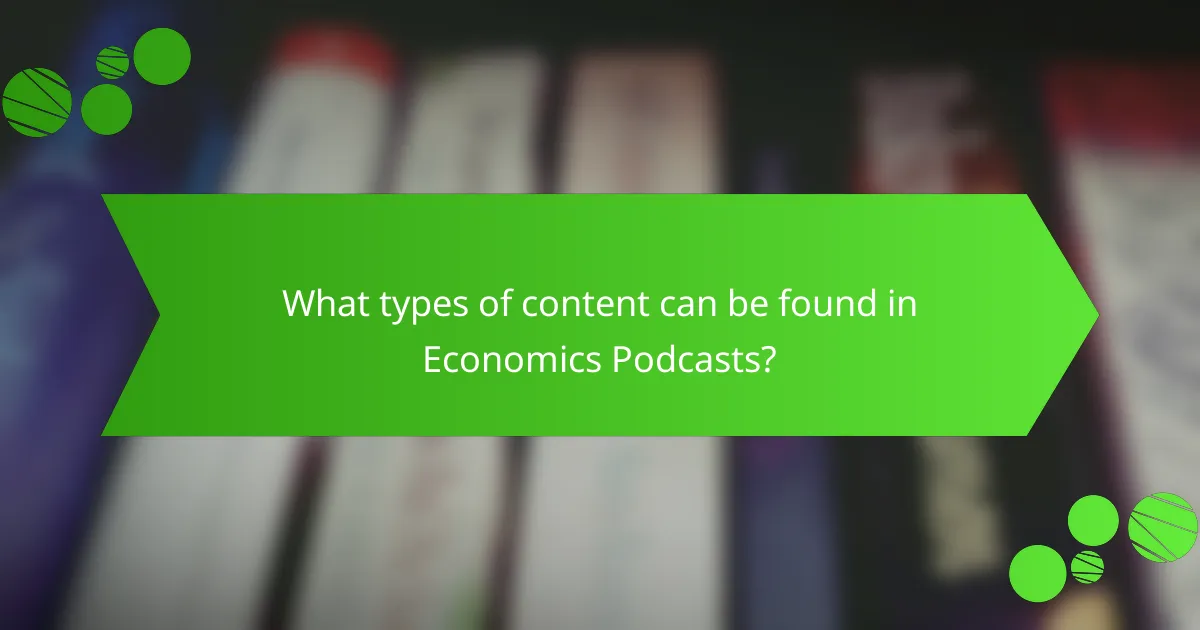
What types of content can be found in Economics Podcasts?
Economics podcasts feature various types of content. Common formats include interviews with economists and industry experts. They often present discussions on current economic events and trends. Educational segments explain economic theories and concepts. Case studies provide real-world applications of economic principles. Some podcasts offer listener Q&A sessions to engage the audience. Additionally, they may include debates on policy issues. These diverse content types enhance understanding of economics for listeners.
What are the main themes covered in Economics Podcasts?
Economics podcasts cover various themes that explore economic concepts and current events. Common themes include macroeconomics, microeconomics, and behavioral economics. They also discuss economic policy, market trends, and financial literacy. Many podcasts feature interviews with economists and industry experts. These discussions often delve into real-world applications of economic theories. Additionally, themes may include international economics and the impact of technology on economies. Some podcasts focus on historical economic events and their relevance today. Overall, these themes aim to educate listeners on complex economic issues in an accessible manner.
How do current events shape the content of Economics Podcasts?
Current events significantly shape the content of economics podcasts. They influence the topics discussed and the perspectives presented. For example, economic downturns lead to discussions on recession strategies. Similarly, policy changes prompt analyses of their potential impacts. Events like trade negotiations spark debates on globalization effects. The COVID-19 pandemic reshaped discussions around economic resilience and recovery strategies. Data from listener engagement shows spikes in downloads during major economic announcements. This indicates that audiences seek timely insights related to current situations. Therefore, economics podcasts adapt their content to remain relevant and informative.
What role do interviews play in Economics Podcasts?
Interviews play a crucial role in economics podcasts by providing expert insights and diverse perspectives. They allow hosts to engage with economists, policymakers, and industry professionals. This format enriches the content, making it more informative and relatable. Interviews can break down complex economic concepts into digestible discussions. They also foster audience engagement by introducing varied viewpoints and real-world applications. Studies show that listeners are more likely to retain information presented through conversations. Moreover, interviews can stimulate critical thinking by challenging conventional wisdom. Overall, they enhance the educational value of economics podcasts while broadening their appeal.
What formats do Economics Podcasts use to engage audiences?
Economics podcasts use various formats to engage audiences effectively. Common formats include interviews, where experts discuss economic concepts. Panel discussions allow multiple perspectives on current economic issues. Solo commentary provides in-depth analysis from a single host. Storytelling formats present economic principles through relatable narratives. Q&A sessions encourage audience interaction by answering listener questions. Case studies illustrate real-world applications of economic theories. These formats enhance understanding and maintain listener interest by providing diverse content delivery methods.
How do storytelling techniques enhance listener engagement in Economics Podcasts?
Storytelling techniques enhance listener engagement in Economics Podcasts by making complex concepts relatable and memorable. These techniques often involve personal anecdotes, case studies, and narrative arcs. Personal anecdotes create emotional connections with listeners. Case studies provide real-world examples that illustrate economic theories. Narrative arcs help structure content, guiding listeners through the information. Research indicates that stories can increase retention of information by up to 65% compared to facts alone. Engaging narratives also maintain listener interest, reducing dropout rates during episodes. Overall, storytelling fosters a deeper understanding of economic topics, leading to a more engaged audience.
What interactive elements are incorporated into Economics Podcasts?
Economics podcasts incorporate various interactive elements to enhance listener engagement. These elements include audience polls, where listeners can provide feedback on topics. Some podcasts utilize Q&A sessions, allowing listeners to submit questions for discussion. Live streaming is another interactive feature, enabling real-time audience participation. Social media integration allows listeners to engage with content and share insights. Additionally, some podcasts offer supplementary materials, such as downloadable resources or discussion forums. These interactive components foster a dynamic learning environment, making economics more accessible and engaging for listeners.
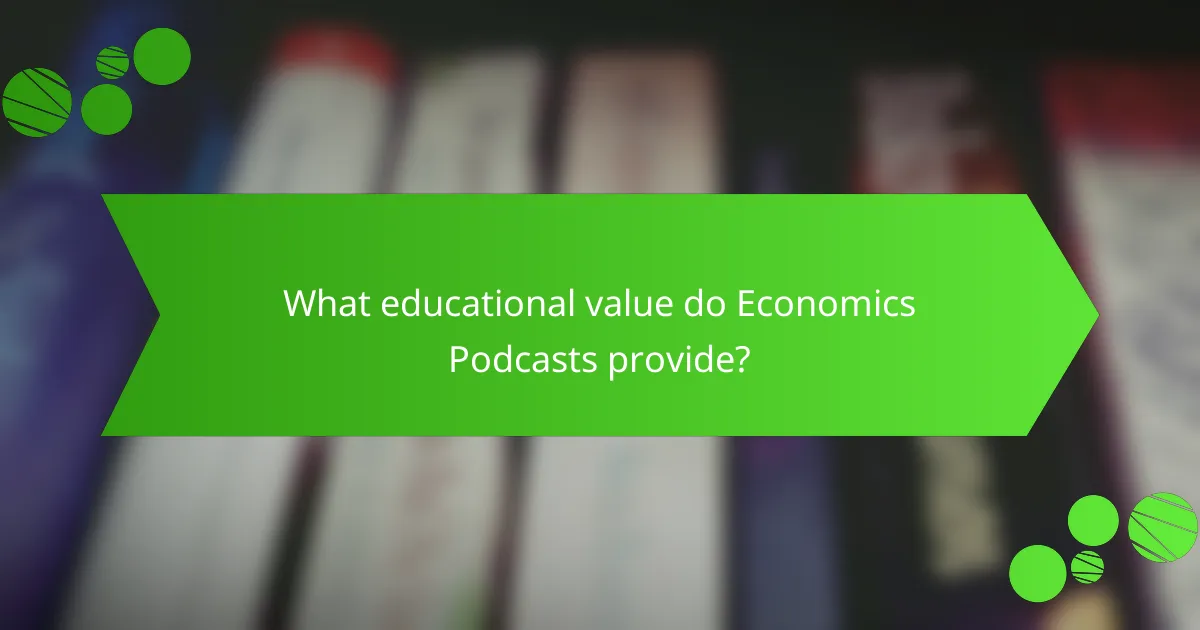
What educational value do Economics Podcasts provide?
Economics podcasts provide significant educational value by enhancing understanding of economic concepts. They present complex theories in an accessible format. Listeners can gain insights from expert discussions and real-world applications. These podcasts often feature interviews with economists and industry professionals. They cover current events and economic issues, promoting critical thinking. Research shows that audio learning can improve retention of information. A study by the University of California found that auditory learning can enhance comprehension by 20%. Overall, economics podcasts serve as an effective tool for lifelong learning in economics.
How do Economics Podcasts facilitate learning?
Economics podcasts facilitate learning by providing accessible and engaging content. They present complex economic concepts in a simplified manner. This format allows listeners to grasp essential ideas without needing prior knowledge. Podcasts often feature expert interviews, enhancing credibility and depth of information. Additionally, they cover a diverse range of topics within economics. This variety caters to different interests and learning preferences. Studies show that auditory learning can improve retention and understanding. Overall, economics podcasts serve as a valuable educational tool for a wide audience.
What are the key learning outcomes for listeners of Economics Podcasts?
Listeners of Economics Podcasts gain a variety of key learning outcomes. They develop a better understanding of economic theories and concepts. This includes grasping supply and demand, market structures, and fiscal policies. They also enhance their analytical skills by evaluating economic data and trends. Exposure to expert interviews provides insights into real-world applications of economics. Additionally, listeners learn to critically assess current economic events and policies. Engaging with diverse perspectives fosters a broader worldview. Overall, Economics Podcasts serve as an accessible resource for continuous learning in economics.
How do Economics Podcasts cater to different learning styles?
Economics podcasts cater to different learning styles by offering diverse formats and content delivery methods. They provide auditory learning through discussions and interviews, appealing to auditory learners. Many podcasts include storytelling elements, which engage listeners and enhance retention, benefiting narrative learners. Visual learners can benefit from supplemental materials like show notes and infographics shared on associated websites. Additionally, some podcasts feature interactive elements, such as Q&A sessions or listener polls, which engage kinesthetic learners. Research by the University of Minnesota indicates that varied instructional methods improve learning outcomes across different learner types. This adaptability makes economics podcasts effective educational tools for a broad audience.
What resources are recommended for enhancing the educational experience of Economics Podcasts?
Recommended resources for enhancing the educational experience of Economics Podcasts include academic journals, online courses, and interactive platforms. Academic journals like the “Journal of Economic Perspectives” provide research-based insights. Online courses from platforms such as Coursera or edX offer structured learning in economic theories. Interactive platforms like Quizlet enable users to engage with economic concepts through flashcards. These resources collectively enhance understanding and retention of economic principles.
How can listeners supplement their learning from Economics Podcasts?
Listeners can supplement their learning from Economics Podcasts by engaging in active note-taking. This practice helps reinforce key concepts discussed in the episodes. Additionally, they can explore related academic articles and books to deepen their understanding. Research shows that reading supplementary materials can enhance retention of information. Joining online forums or discussion groups allows listeners to exchange ideas and clarify doubts. Participating in these communities fosters collaborative learning. Lastly, applying economic theories to real-world scenarios can solidify comprehension. Practical application is a proven method for better grasping complex subjects.
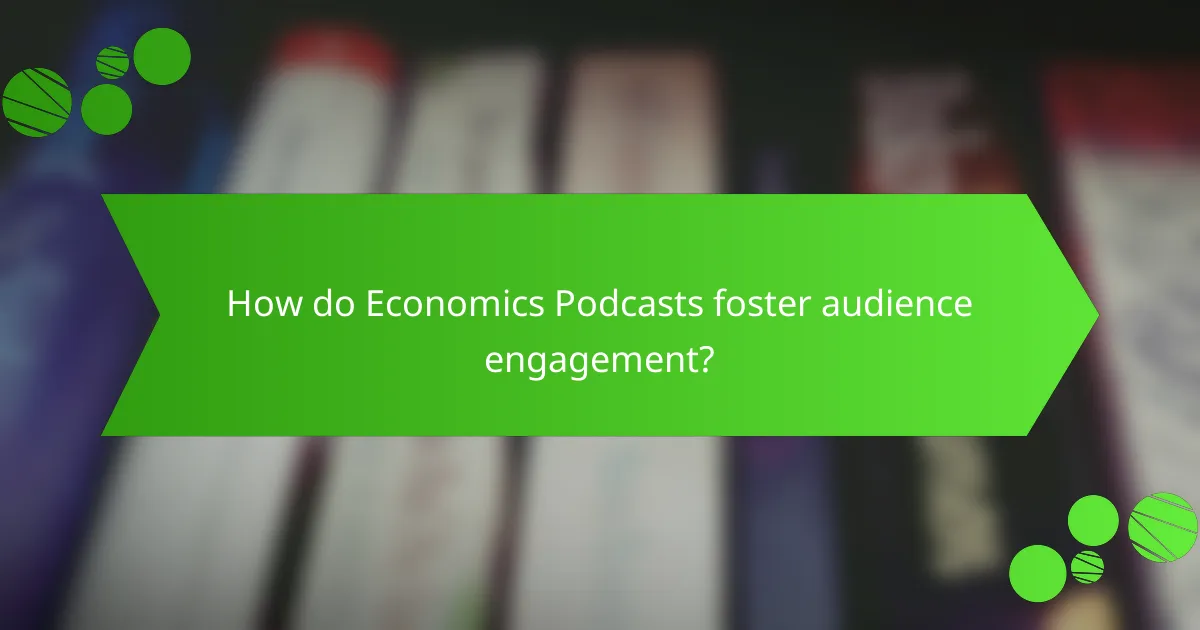
How do Economics Podcasts foster audience engagement?
Economics podcasts foster audience engagement through interactive discussions and relatable content. They often invite listeners to submit questions or topics, creating a two-way communication channel. This interaction helps audiences feel involved in the conversation. Additionally, podcasts cover current economic events, making the content timely and relevant. Engaging storytelling techniques also capture listeners’ attention. Research shows that 70% of podcast listeners feel more connected to hosts due to their personal narratives. Furthermore, the use of expert interviews provides diverse perspectives, enhancing listener interest. Overall, these strategies create a dynamic listening experience that keeps audiences engaged.
What strategies do Economics Podcasts use to build community?
Economics podcasts build community through interactive platforms, social media engagement, and listener feedback. They often create dedicated online forums or social media groups where listeners can discuss episodes. Many podcasts encourage audience participation by soliciting questions or topic suggestions. They host live events or webinars to connect with listeners in real time. Some podcasts collaborate with guest experts, fostering a sense of shared learning. They also utilize newsletters to keep the community informed and engaged. These strategies enhance listener loyalty and create a sense of belonging among the audience.
How do social media platforms enhance audience interaction with Economics Podcasts?
Social media platforms enhance audience interaction with Economics Podcasts by facilitating direct communication and engagement. These platforms allow listeners to share thoughts and feedback in real-time. Users can comment on episodes, create discussions, and ask questions directly to hosts. This interaction fosters a sense of community among listeners. Additionally, social media enables the sharing of podcast content, increasing visibility and attracting new audiences. According to a study by Edison Research, 54% of podcast listeners discover new shows through social media. This statistic underscores the effectiveness of social media in promoting audience engagement with Economics Podcasts.
What role do listener feedback and participation play in Economics Podcasts?
Listener feedback and participation significantly enhance the quality and relevance of Economics Podcasts. Feedback allows hosts to understand audience preferences and interests. This interaction shapes content direction and topic selection. Participation fosters a sense of community among listeners. Engaged listeners often contribute questions and suggestions. This collaborative dynamic can lead to more diverse and informative episodes. Research shows that podcasts with active listener engagement tend to have higher retention rates. According to a study by Edison Research, 68% of podcast listeners appreciate when hosts address audience feedback. This illustrates the importance of listener involvement in shaping podcast content.
What best practices can creators follow to improve audience engagement in Economics Podcasts?
Creators can improve audience engagement in economics podcasts by focusing on interactive content. Incorporating Q&A sessions encourages listener participation. Utilizing social media for discussions enhances community involvement. Regularly featuring expert guests adds credibility and diverse perspectives. Structuring episodes with clear segments maintains listener interest. Employing storytelling techniques makes complex concepts relatable. Providing supplementary materials, like show notes or articles, aids comprehension. Lastly, analyzing listener feedback allows for continuous improvement and adaptation.
Economics podcasts are audio programs that focus on various topics related to economics, including market trends, theories, and financial news, often featuring expert interviews. They differ from traditional media by offering on-demand content and in-depth discussions, making complex economic concepts more accessible. The article explores the diverse formats utilized in economics podcasts, their educational value, and the factors contributing to their growing popularity, including listener demographics and engagement strategies. Additionally, it highlights how current events shape podcast content and the role of storytelling and interactive elements in fostering audience engagement.
